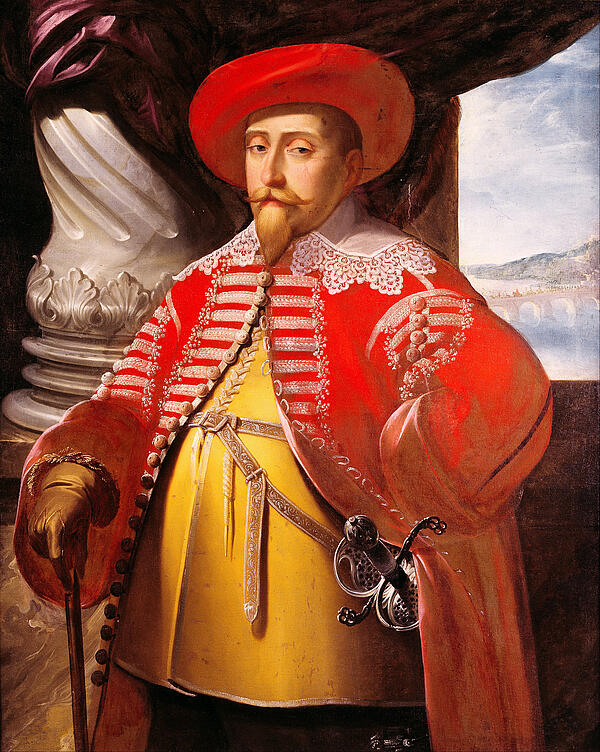Gustavus Adolphus - Domestic Policy
Gustavus Adolphus’ implemented several important domestic reforms during his time as King of Sweden. These domestic reforms helped Sweden fight effectively in the Thirty Years War: the conflict that dominated the latter years of Adolphus’ reign.
Speaking before his coronation in 1617, Gustavus Adolphus said these words:
“I had carefully learned to understand, about that experience which I could have upon things of rule, how fortune is failing or great, subject to such rule in common, so that otherwise I would have had scant reason to desire such a rule, had I not found myself obliged to it through God’s bidding and nature. Now it was of my acquaintance, that inasmuch as God had let me be born a prince, such as I then am born, then my good and my destruction were knotted into one with the common good; for every reason then, it was now my promise that I should take great pains about their well-being and good governance and management, and thereabout bear close concern.”

Reforms to Swedish Government
Much of the work to reform the government system was done by Axel Oxenstierna. The council became the highest organ of central government instead of a centre for aristocratic opposition to the king.
Before Gustavus’ reign, the council had met irregularly at the king’s order. When this order came, it had to gather whether the king was. This was not a practical set-up.
Under Gustavus, the council established a permanent seat in Stockholm. When the king was abroad, the council was allowed to take important decisions. The five chief officers were the Chancellor (Axel Oxenstierna), the Admiral, the Marshall, the High Steward and the Treasurer.
These titles had existed before Gustavus but now they were endowed with more power. Each man headed a working government department. Every department was organised in a collegial style with a specific working procedure. These systems were established through a series of ordinances. In 1614, the Judicature Ordinance set out the system for the high Steward. In 1618 the Chancery and the Treasury were made into permanent administrative boards. A War Office and Admiralty were also created during the reign of Adolphus.
The Riksdag (Diet) played a role in government. This body had traditionally been the king’s ally during conflicts with the nobility. During Adolphus’ reign, it developed a clear procedure and later in the century took over the role of the Rikstad. In 1617, Gustavus brought in the Riksdag-Ordinance which organised the Riksdag and fixed the number of estates to four: the nobles, the clergy, the burghers and the peasants. The Diet represented the wide range of people and their support of Adolphus’ foreign policy was a good advantage.
Local and provincial government was also re-organised. Twenty-three administrative districts were established. Each one was governed by a royal officer and his staff in accordance to Gustavus’ Instruction of 1624.
These reforms gave many sectors of society a vested interest in government. There was no real dissent during Adolphus’ region. Gustavus did have an important advantage: his reign was relatively free of religious turmoil because everyone in Sweden was Lutheran.
Reforms to the Swedish Economy
The economy of Sweden was forced to finance expensive wars during Adolphus’ reign. Gustavus encouraged skilled foreign workers and foreign businesses to move to Sweden. For example, the Dutchman Louis de Geer was an important figure in the arms industry.
France supported Sweden by providing subsidies during the Thirty Years War. Sweden could also exploit the custom dues of German ports which were they captured during the war.
Reforms to the Swedish Military
Gustavus Adolphus educated himself in modern artillery, logistics, military organisation and strategy. Maurice of Nassau was an important influence militarily.
Adolphus created the first properly national army in Europe. However, as he became more deeply involved with European wars, he was forced to also rely on mercenaries. His army was disciplined. Because the troops from each unit were recruited from a particular local area, there was a good esprit de corps. Soldiers received training and modern equipment and were regularly paid.
Part of the army’s success centred around its good mobility and high rate of fire. Gustavus deployed small units in line on a battlefield instead of units in depth which were more susceptible to artillery fire. Gustavus favoured light manoeuvrable artillery. The cavalry would barge into the enemy and then engage in hand-to-hand fighting.
Gustavus also reformed the Swedish navy so that he could effectively move his troops across the Baltic. Sweden’s sealanes across the Baltic to Poland and Germany also had to be protected. The same professional spirit that was now evident in the army was injected into the Navy. This also helped enhance Sweden’s trading routes which helped increase Sweden’s revenue.
Gustavus held one great advantage. He had the support of the people of Sweden and this meant that his policy of universal conscription was not hugely controversial.
Reforms to Swedish Education
Gustavus was an important figure in the history of Swedish education. Sweden’s modernised army and government needed a constant supply of well-educated men. He founded the Gustav Adolf Grammar School in Tallinn in 1631 and the University of Tartu in 1632. He also heavily supported the University of Uppsala. He expanded the university and in 1624 donated to the university his inherited property in the Uppland and Västmanland provinces, which gifted the university a healthy income. The university was considered to have a very modern administrative set-up.
See also: Gustavus Adolphus - Foreign Policy
MLA Citation/Reference
"Gustavus Adolphus - Domestic Policy". HistoryLearning.com. 2024. Web.
